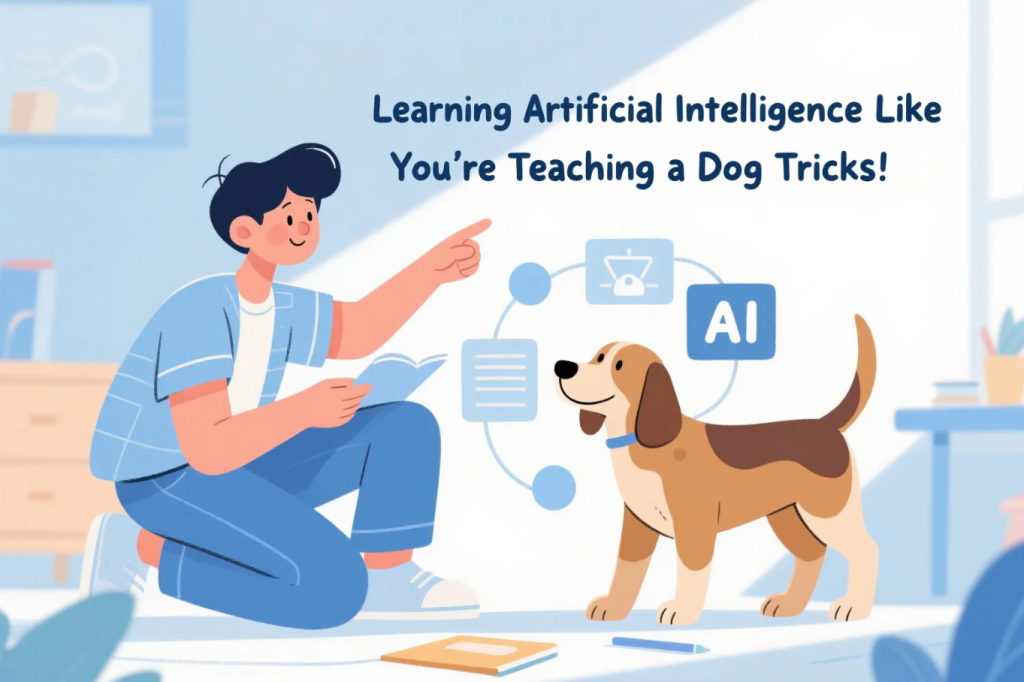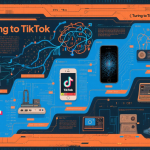Imagine Teaching a Dog to Sit
Let’s start with something familiar. Imagine teaching your dog to sit. You say “sit,” point your finger downward, and when the dog responds correctly, you toss it a treat. After a while, your dog gets it: “Sit = Treat.”
Congratulations. You’ve just understood the core of how machine learning works.
Artificial Intelligence (AI) is often buried under layers of jargon, sci-fi fearmongering, and flashy marketing. But at its heart, AI is about teaching machines to learn from patterns—just like teaching your dog a trick.
This guide will walk you through AI in the most down-to-earth way possible. No complex algorithms, no code, just clear explanations for real people who want to understand the biggest tech wave of our time.
What AI Isn’t
Before we talk about what AI is, let’s clarify what it isn’t:
- It’s not magic.
- It’s not human.
- It’s not conscious.
AI doesn’t think. It doesn’t dream. It doesn’t have opinions or feelings. At best, it’s like a super obedient intern who learns quickly from examples and follows patterns—relentlessly.
The Coffee Shop Analogy
Let’s say you walk into a coffee shop every day and order a caramel latte. After two weeks, the barista starts preparing your latte the moment they see you walk in. That’s a real human learning from observation.
Now replace the barista with an AI.
The AI would note:
- You come in around 8:15 AM
- You wear a blue jacket
- You tap your card, not pay cash
- You always ask for “extra hot”
Eventually, it predicts what you want before you say a word. This is predictive AI in a nutshell—based on repeated behavior and patterns.
That’s how recommendation systems work. Not because the machine knows you, but because it’s been trained on data about people like you.
Data Is the New Dog Treat
AI is hungry—for data.
The more examples you feed it, the smarter it gets. Just like your dog needs multiple training sessions to master “roll over,” AI needs lots of practice.
Want an AI that recognizes apples? Feed it thousands of apple photos in all shapes, colors, lighting, and angles.
Want an AI that writes poetry? Feed it a million poems from the past century.
AI doesn’t understand apples or poetry the way you do. But with enough data, it mimics understanding.
Not All AI Is Created Equal
Let’s break AI down by behavior, not buzzwords.
1. Pattern Matchers
These are the simplest AIs. They recognize patterns and respond accordingly. Your spam filter is a good example.
2. Predictive AIs
These guess what’s likely to happen next. Stock trading bots, weather apps, and Netflix all use this.
3. Generative AIs
They create new stuff. Think ChatGPT writing essays or DALL·E generating art. These systems “learn” from massive datasets and create something similar but original.
Generative AI is like a remix artist: it never invents from scratch, but it sure sounds creative.
The Iceberg of Intelligence
Most of AI’s intelligence is hidden beneath the surface—like an iceberg.
What you see:
- Auto-suggestions
- Voice assistants
- Selfies with dog ears
What you don’t see:
- Training datasets
- Massive cloud servers
- Thousands of hours of computation
- Biased assumptions built into the models
Understanding AI means recognizing the invisible work. It’s less “smart robot” and more “giant spreadsheet monster crunching numbers behind the curtain.”

AI in the Wild – Where It’s Hiding
Chances are, you’ve encountered AI today without realizing it. Here’s a list of places where AI quietly exists:
- Social Media: Determines what shows up in your feed.
- Banking: Flags suspicious transactions.
- Healthcare: Helps doctors spot early signs of disease.
- HR Software: Screens résumés before a human even looks.
- Retail: Adjusts product prices based on demand.
AI is like plumbing: invisible until something breaks, but running everywhere.
The Problem of “Garbage In, Garbage Out”
AI is only as smart as the data it’s trained on.
- Train it on biased hiring data? It will become a biased recruiter.
- Feed it toxic internet comments? It will start talking like a troll.
- Give it outdated facts? It will confidently repeat them.
If the input is garbage, the output will be too. That’s why AI needs ethical supervision—human editors, clear boundaries, and transparent audits.
Should You Fear AI? Not Exactly
Most people fall into two traps:
- Blind fear (AI will destroy humanity!)
- Blind trust (AI will solve everything!)
Both are wrong.
The real answer? AI is powerful but dumb.
It’s like giving a chainsaw to a toddler. Without guardrails, it’s dangerous. With proper guidance, it can carve art.
You should understand AI not to worship or fear it, but to steer it.
So… How Can a Beginner Start Exploring AI?
No coding skills? No problem. Here are some friendly ways to get into AI:
1. Use AI tools
Try:
- ChatGPT (for writing)
- DALL·E (for images)
- Google Bard (for search enhancement)
- RunwayML (for video and design)
Playing with AI is the fastest way to understand it.
2. Watch AI explainer videos
Great channels:
- ColdFusion
- 3Blue1Brown (for deeper dives)
- AI Explained
3. Listen to podcasts
- “Hard Fork” by NYT
- “Lex Fridman Podcast”
- “Eye on AI”
4. Read beginner books
- AI Superpowers by Kai-Fu Lee
- You Look Like a Thing and I Love You by Janelle Shane

AI Without Algorithms – Real-Life Applications
Still skeptical about how it all connects? Let’s map AI to everyday stuff.
| Task | AI Version |
|---|---|
| Sorting your junk mail | Spam filter |
| Autocorrecting your message | Natural Language Processing |
| Suggesting your next YouTube video | Recommendation Engine |
| Translating a document instantly | Neural Machine Translation |
| Turning your sketch into a painting | Generative AI |
You don’t have to “get” the code to see the results.
The Future – AI as Co-Pilot, Not Captain
The best way to think about AI?
As a tool, not a boss.
A calculator for complex ideas, not a mind of its own.
AI can’t make ethical choices, feel empathy, or know right from wrong. That’s your job. But if you can master when and how to use AI, you’ll be miles ahead.
You don’t need to be a genius to ride the AI wave. You just need to learn how to surf.
From Fear to Fluency
AI isn’t about replacing humans. It’s about augmenting us.
Think of AI as a weirdly brilliant assistant—clumsy sometimes, but undeniably helpful when trained well.
So, next time someone says “AI is too complicated,” remind them: It’s just like teaching a dog to sit—only now, the dog is a server farm with a PhD in pattern recognition.
And you? You’re the trainer.


